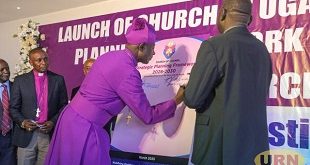
Link to President Museveni unknown birthday and why many Ugandans don’t like that
Currently, the government through the Ministry of Public Service is registering and validating data of its pensioners. This census is scheduled to end on Mar.30.
It follows a head count of public servants done mid-last year by the government.
Both censuses are designed to ensure compliance in a sector that has been plagued by bogus statistics and phantom characters, commonly called `ghosts’ on payrolls.
For each of them, the government insisted that each civil servant will only be registered upon proof that they have a National ID. Those without one would be deleted from the payroll.
This action saw civil servants without national IDs scampering to get them. In the ensuing panic, some travelled from far away stations to the National Identification and Registration Authority (NIRA) head quarters in Kololo, Kampala, to register or pick cards they registered for but had been reluctant to collect.
But the biggest registration project currently running is one where NIRA is registering children aged between five and 16 years. At the end of first term, as children break for a holiday, they will be given enrollment forms to fill with their parents. One of the requirements for the children to be registered is a photocopy of one vital document from the parent or guardian – the national ID.
Key to access
The recent rush to register for almost everything is a stark contrast to 2015 when Uganda passed a seemingly innocent law called the Registration of Persons Act which provided for the establishment of NIRA.
Initially, there was even doubt when the government announced that the national ID number would be used as a key to accessing services. Two years later, the law has started to be felt; there is now registration required for almost everything and the national ID has become the must have document and spawned a rush of other registrations.
“All data that is collected even by other government agencies is linked to the national data base at NIRA,” says Michael Muganga, the Deputy Spokesman of NIRA.
He told The Independent that the government also plans to later register children aged between zero to five years. He said the exercises are a continuation of the 2014 exercise where adults of 16 years and above were registered and later given national ID cards.
The t Shs53billion exercise to start next term expects to register about 10 million children in both private and government secondary and primary schools across the country over the three months.
“Government has never known the exact number of children in school. They just use estimates,” Muganga said.
Experts are excited about the government’s new interest in accurate, up-to-date data on citizens.
James Ntozi, a professor of Population studies at Makerere University school of Statistics and Planning says being registered should not be taken lightly because Uganda could soon be like the developed world where not being registered can cut one off from basic services. This could be medical service, running for an electoral office, or even getting a job. He says the current cocktail of data collection exercises and laws communicate the fact that government is waking up to bridge the huge statistics gap that has existed for long.
 The Independent Uganda: You get the Truth we Pay the Price
The Independent Uganda: You get the Truth we Pay the Price



